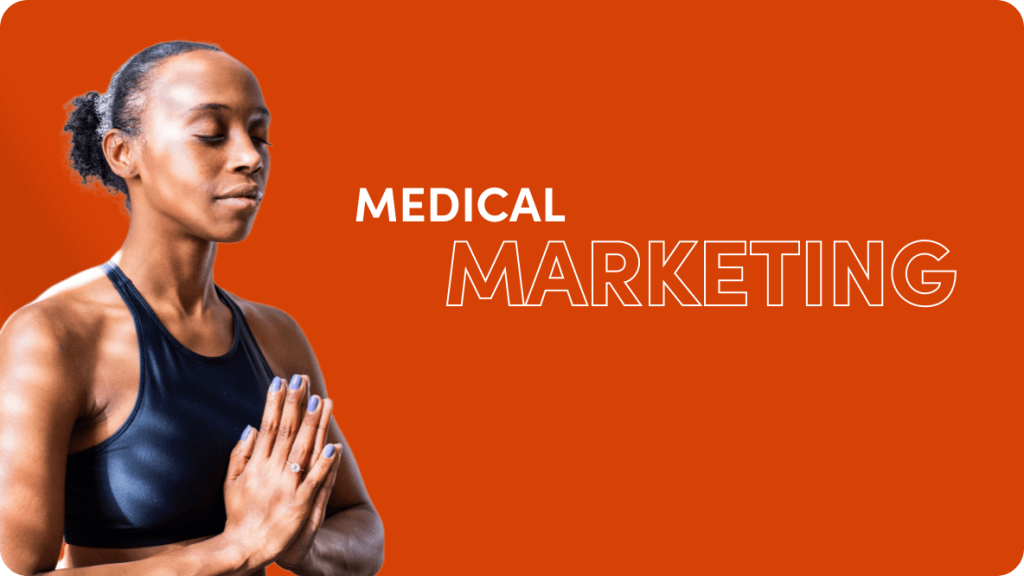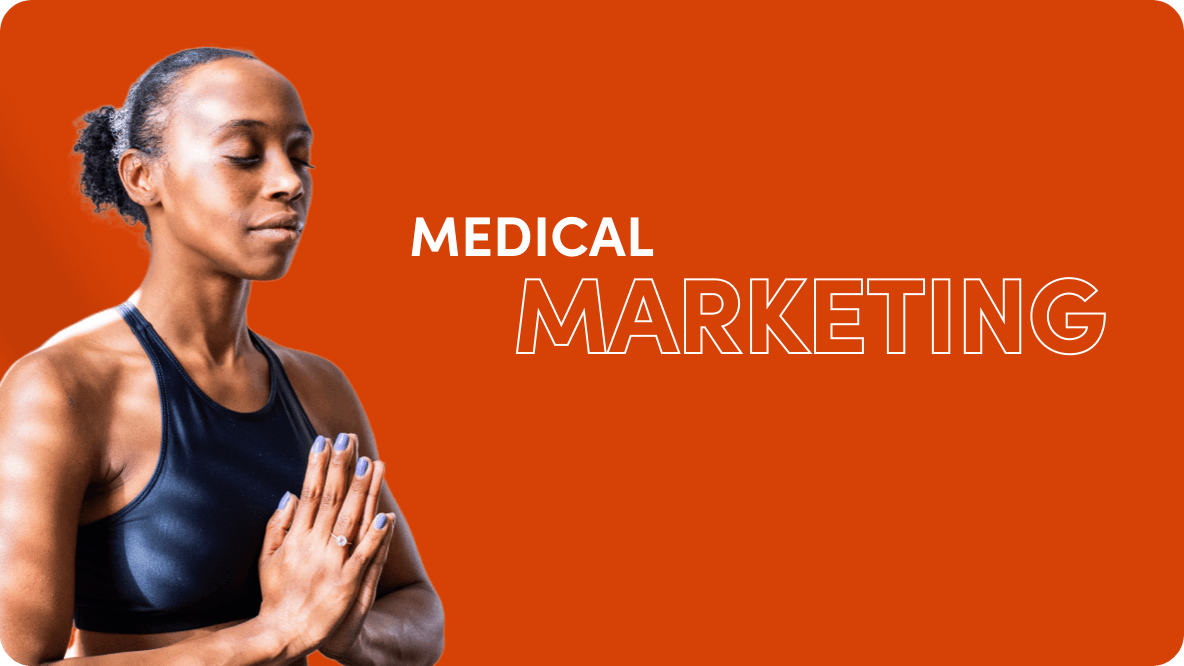Top 5 Digital Strategies for Medical Services Marketing

What’s the first thing that most people do when they have a weird physical symptom?
They look it up on the internet.
As it happens, this may not be a good idea.
Asking “Dr. Google” about health problems can add stress and worry, so they feel even worse. It’s even got a name: cyberchondria.
But medical and health services are exploding online anyway, as are many other consumer activities, like shopping, banking, and booking appointments. Consumers find it convenient and handy to have access to digital medical information and health services on the internet. Case in point? Telemedicine, which is gaining ground, especially after the global pandemic. In 2021, 37% of US adults had used some form of telemedicine.
From searching and consuming medical information on Google, to consulting with doctors and counselors on Zoom, to booking and paying for health-related services on apps and websites, the digital arena provides immense potential for health providers to market, sell, and deliver medical products and services.
But in an area where competition is fierce and regulations are stringent, how can you ensure your brand stands out and reaches the right audience?
Let’s take a look at the top 5 digital strategies for medical services marketing, and how they can help your business thrive.
1. Search Engine Marketing
When people search Google, there is always one key goal: finding an answer to a problem. They may be shopping for a new blood pressure monitor, or perhaps they want to know why their shoulder hurts. But the aim is always the same – they want a solution or some form of relief.
Most individuals today turn to search engines to find healthcare information or services; around 5% of all Google searches are health-related. This makes it crucial for your medical practice to be prominently displayed when relevant queries arise.
According to Google, search drives 3x more visitors to medical sites compared to non-search, and search is the preferred way for patients to find healthcare providers online. Moreover, ranking high in search engine result pages (SERPs) is paramount for any medical provider who wants to stand out from the competition.
Why search engine rankings matter:
- Visibility and credibility: Ranking at the top positions in search results increases your visibility and enhances your credibility in the eyes of potential patients. It signifies authority and trustworthiness, compelling users to click on your website.
- Competitive edge: Outranking competitors for relevant keywords sets you apart in a crowded healthcare marketplace. Moreover, it ensures that your services are the first choice when patients are seeking medical information or assistance.
- Targeted traffic: High rankings attract organic, high-quality traffic. In fact, these visitors are actively searching for services you provide, making them more likely to convert into patients.
Organic search tactics:
For organic search, content marketing involves producing and promoting valuable, informative, and patient-focused content on your website, blog, social media pages, and YouTube channel. This helps you rank higher in search results by demonstrating your expertise and providing answers to patients’ search queries. Here are some key tactics for organic search:
- Keyword optimization: Research and strategically use relevant keywords throughout your website’s content, including titles, meta descriptions, and headings.
- Quality content: Regularly publish informative and engaging content, such as blog articles and medical guides, addressing patients’ common concerns and questions.
- On-page SEO: Ensure your website’s technical aspects, like site speed, mobile-friendliness, and secure browsing, are optimized.
- Backlink building: Cultivate high-quality backlinks from authoritative healthcare websites to boost your site’s credibility.
Paid search tactics:
On the other hand, paid search strategies complement organic efforts by allowing you to bid on keywords and create targeted ad campaigns that instantly place your services at the top of search results. Check out these key tactics for paid search:
- PPC advertising: Invest in Pay-Per-Click campaigns using platforms like Google Ads to bid on keywords relevant to your medical services. This guarantees your website appears at the top of search results for those keywords.
- Ad extensions: Enhance your ads with extensions that provide additional information like location, contact details, and call-to-action buttons.
- Keyword research: Thoroughly research and select keywords with high search volumes and low competition to maximize the effectiveness of your PPC campaigns.
2. Online Reputation Management
The medical and health industry is uniquely personal and sensitive for customers. It deals with intimate and important issues, and consumers are naturally wary of online offers that seem too good to be true, or medical marketing campaigns that make unrealistic claims and promises. That’s why medical providers must tread very carefully, both in terms of regulatory restrictions and the customer’s feelings.
When people explore medical services online, they’re not only seeking a solution for their pain point – they are looking for trust, reliability, and assurance. In fact, 90% of patients rely on online reviews from fellow consumers when choosing a physician. In other words, a good reputation online is one of the most important aspects for medical brands and service providers.
Why online reputation matters
- Trust and credibility: Your online reputation is a reflection of your authority and expertise. Patients are more likely to trust medical professionals and facilities with a good reputation and a high number of positive reviews.
- First impressions: For many, your online presence is their first interaction with your practice. A strong reputation ensures that this first impression is positive and will lead to further interaction.
- Influence on decision-making: Most patients turn to reviews and testimonials when choosing a healthcare provider. A solid reputation can sway their decision in your favor.
How to cultivate a solid online reputation
- Encourage positive reviews: Satisfied patients are your greatest advocates. Encourage them to leave reviews on reputable healthcare review sites and on your own website. Make the process as straightforward as possible.
- Respond to reviews: Whether the feedback is positive or negative, respond professionally and promptly. Thank patients for their kind words and address any concerns or criticisms with empathy.
- Monitor what people are saying online: Use social monitoring tools like Mention to track the online conversations around your business, so you can deal with important questions, comments, and discussions promptly.
- Transparency: Be transparent about your services, pricing, and qualifications. Honest and open communication can help build trust.
- Consistency: Maintain consistent branding and messaging across all online platforms. This includes your website, social media profiles, and third-party review sites. Consistency fosters recognition and trust.
- Quality content: Regularly publish high-quality, informative content that showcases your expertise and addresses patient questions and concerns.
- Social media engagement: Actively engage with your audience on social media. Respond to comments, share relevant content, and foster a sense of community.
- Online security: Ensure the security of patient data and sensitive information. Take the utmost care with patient privacy to avoid negative consequences for your reputation.
- Seek professional guidance: If necessary, consider enlisting the services of online reputation management professionals. They can help monitor your online presence, address issues, and devise strategies to bolster your reputation.
Perhaps the most potent weapon in your medical services marketing arsenal is the provision of excellent patient care. When patients feel valued and well-cared for, the impact of any negativity online can be more easily mitigated.
3. Video Marketing
Video is a powerful marketing tool for medical service providers to engage, educate, and connect with their audiences. Video content gets higher consumption rates than other content – 55% of people pay attention to online video, so it is no wonder that nearly 90% of marketers use video as a key tool and tactic.
Here are some ways that video can be used to boost efforts in medical services marketing:
- Educational videos: Video is an ideal medium for simplifying complex medical information. Create short, informative videos that explain common medical conditions, treatment options, or preventive measures. Patients often find visual explanations easier to comprehend than text.
- Webinars and live Q&A sessions: Hosting online webinars provides a platform to directly engage with your audience. These interactive formats are the ideal setting to discuss trending medical topics, share insights, and address patient queries in real time, establishing your practice as a trusted source of medical knowledge.
- Introducing your medical team: Humanize your practice by introducing your medical team through video profiles. This helps patients connect with the faces behind the medical expertise, building a sense of comfort and trust.
- Showcasing medical procedures or devices (with patient consent): Offering visual insights into medical procedures or how to use medical products can demystify the process for patients and alleviate anxiety. Ensure you have proper patient consent and adhere to privacy regulations. Highlighting your facilities and safety protocols can further reassure potential patients.
- Behind-the-scenes insights: Provide a glimpse behind the curtains of your practice with “day in the life” videos or virtual tours. Behind-the-scenes views offer transparency and allow patients to become more acquainted with your facility, staff, and experience with your clinic or service.
4. Branded Native Advertising
Native advertising is a powerful online tactic enabling medical businesses to advertise on high-quality websites, outside of the closed ecosystems of social media platforms. With branded native ads, the medical provider can get their ‘name’ to appear in an unobtrusive way on popular websites, far more effectively than regular display ads.
By strategically placing native ads on news and entertainment websites, you can expose your audience to relevant medical-focused content while they browse, capturing attention when they are naturally curious and open to new products and ideas. Because native ads ‘match’ the look and feel of the site where they appear, they seem like organic content, not ads, helping to build trust and credibility.
The success of native ads largely depends on crafting effective ad copy, combined with strategic audience targeting and bidding strategies, like the case study below.
Case study: Eargo
Eargo, a manufacturer of invisible, comfortable, and rechargeable hearing aids, wanted to increase online sales by obtaining more qualified leads. Their target audience was very specific in terms of their interests, location, and demographics.
With Outbrain native advertising, Eeargo used advanced medical services marketing tactics including Custom Audiences, interest targeting, and geographic and demographic targeting to pinpoint and target only those audiences that were most likely to purchase their products.
The result? 100% better sales conversion compared to social media and 40% better sales conversion vs. other native advertising platforms.
5. Omnichannel Patient Experiences
The typical customer has about 9 interactions with a business before they decide to purchase. These touchpoints include online searches, website visits, watching video content, following the business on social media, chatting with customer reps online, and even phone calls. In fact, nearly 40% of conversions in the medical industry happen on the phone, and over 50% of customers are more likely to pick up the phone after searching online for a medical service or product.
Omnichannel marketing is critical to tie all those online and offline experiences together and deliver a comfortable, compelling, and convenient experience for patients and customers. In essence, the purpose of an omnichannel approach is to ensure consistency and continuity in patient interactions across various touchpoints.
Here are some examples of omnichannel tactics that make it easier for customers to engage with your medical practice:
- Streamlined online booking: Offer a user-friendly web page or app where patients can easily book, change, or cancel appointments online. This not only enhances convenience but also reduces administrative burden, improving efficiency for both patients and staff.
- Thoughtful reminders: Send appointment reminders via email or SMS to minimize no-shows and last-minute cancellations. These reminders demonstrate your commitment to patient care and convenience.
- Personalized email campaigns: Engage patients with personalized email offers and relevant content. Tailor your communications to their specific needs, from wellness tips to post-treatment follow-ups.
- Virtual product demos: Incorporate online product demos to educate patients about medical services or products. These can be shared via email newsletters and social media, and can ‘live’ on your website as helpful resources for the target audience.
- Real-time online support: Integrate online chat and/or phone support for instant responses to patient queries. This real-time engagement demonstrates attentiveness and bolsters trust.
- Post-treatment feedback: Gather patient feedback through surveys or follow-up emails after treatment or product purchases. This not only shows you value their opinions but also provides insights for continuous improvement.
Final Word: The Importance of Tracking Your Medical Marketing Campaigns
Tracking and measuring campaigns is a key part of medical services marketing. It provides data-driven insights that help you understand your customer base, their preferences, and interests, so you can craft and optimize campaigns that really speak to their needs.
By proactively monitoring your online medical marketing campaigns, you gain invaluable knowledge about what works and what needs adjustment. This helps you to refine your strategies, allocate resources wisely, and optimize the patient experience.
In an industry where precision and trust are paramount, data-based insights are your competitive edge. Every click, every engagement, and every conversion tells a story.
Use those stories to connect with patients, enhance your reputation, and ultimately, deliver the best medical marketing campaigns.











